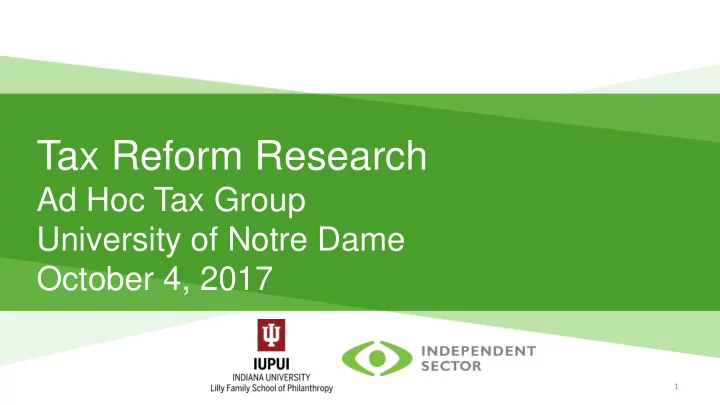

Tax Reform Research Ad Hoc Tax Group University of Notre Dame October 4, 2017 1
Agenda I. Research Purpose II. Research Design III. Findings a. Chapter 1: Universal Charitable Deduction b. Chapter 2: Republic Tax Reform Proposals c. Chapter 3: Republican Proposals + Universal Charitable Deduction d. Chapter 4: Religious Giving IV. Summary V. Discussion 2
Purpose • Examine the overall effect of the tax policy changes proposed in the 2014 Camp Tax Reform Act* on charitable giving • Analyze how a non-itemizer charitable deduction, when combined with the other policy proposals, may impact charitable giving *The differences between the Camp Proposal, the White House Proposal, and the House Tax Reform Blueprint are negligible. 3
Research Design 4
Core Research Questions 1. What is the effect on charitable giving if the charitable tax deduction is expanded to non-itemizers, in addition to itemizers? 2. How do the proposed tax policy changes affect taxpayers’ charitable giving across income levels and by charitable subsector (religious versus non-religious)? 3. What are the effects of these policy changes on tax revenue collected by the Treasury? 5
Methodology Internal Revenue Service Statistics of Income Public Use File, 2009 1 • Partnered with the Open-Source Policy Center (OSPC) at American Enterprise Institute (AEI) to use their tax-calculator microsimulation model to simulate proposed changes in tax policy Panel Study of Income Dynamics (PSID), Philanthropy Panel Study (PPS) • Longitudinal household dataset following the same families and their decedents from 1968-2015 • PPS collects data on household giving (available 2001-2013) 1 2009 is the most recently available dataset
Key Concepts: Tax-Price Elasticities & Non-itemizer Giving Challenges Solutions Tax policy analysis often relies The PSID includes giving by on IRS SOI PUFs, which do not non-itemizers which allows us to include data on giving by non- estimate average giving by non- itemizers. itemizers. Previous analyses often rely on Using the PSID, we can assumed elasticities for the calculate price-tax elasticities for effect of tax price on giving (-0.5 each income group. and -1.0).
Research Findings 8
Highlights • A 35% tax rate and an expanded standard deduction would reduce charitable giving by $13 billion • Tax policy proposals impact religious and secular organizations relatively evenly 9
Chapter 1: Universal Charitable Deduction Proposal to extend the charitable deduction to all taxpayers 10
Extension of the charitable deduction to non- itemizers (only) -12.0% -8.0% -4.0% 0.0% 4.0% 8.0% 12.0% 4.3% Charitable $12.2 billion Giving 8.37% Charitable 8.38% Giving 1.55% Total .47% Revenue $13.1 billion -1.57% Revenue -1.06% -0.23% Under $50,000 $50,000-$99,999 $100,000
Chapter 2: Republican Proposals • Decrease top tax rate to 35% • Expand the standard deduction to more tax payers – $11,000 for single households – $22,000 for married households 12
Increase in the value of the standard deduction 1 (only) -12.0% -8.0% -4.0% 0.0% 4.0% 8.0% 12.0% 3.9% Charitable $11.0 billion Giving -2.67% Charitable -6.90% Giving -3.28% Total 2.3% Revenue $64.2 billion -10.42% Revenue -5.20% 1 $11,000 for individuals, $22,000 for joint filers -0.85% Under $50,000 $50,000-$99,999 $100,000
Decrease in the highest marginal tax rate from 39.6 percent to 35 percent (only) -12.0% -8.0% -4.0% 0.0% 4.0% 8.0% 12.0% .75% Charitable $2.1 billion Giving 0.00% Charitable 0.00% Giving -1.25% Total .86% Revenue $24.1 billion 0.00% Revenue 0.00% -1.14% Under $50,000 $50,000-$99,999 $100,000
35% Tax Rate + Expanded Standard Deduction -12.0% -8.0% -4.0% 0.0% 4.0% 8.0% 12.0% 4.6% Charitable $13.1 billion Giving -2.67% Charitable -6.90% Giving -4.52% Total 3.2% Revenue $88.2 billion -10.42% Revenue -5.20% -1.99% Under $50,000 $50,000-$99,999 $100,000
Chapter 3: Republican Proposals + Universal Charitable Deduction • Decrease top tax rate to 35% • Expand the standard deduction to more tax payers – $11,000 for single households – $22,000 for married households • Extend charitable deduction to all taxpayers 16
Republican Proposals + Universal Charitable Deduction -12.0% -8.0% -4.0% 0.0% 4.0% 8.0% 12.0% 1.7% Charitable $4.8 billion Giving 5.30% Charitable 7.25% Giving -1.34% Total 3.8% Revenue $106.1 billion -11.81% Revenue -6.66% -2.37% Under $50,000 $50,000-$99,999 $100,000
Chapter 4: Religious Giving How may tax reform proposals impact religious giving? 18
Impact on Religious Giving -12.0% -8.0% -4.0% 0.0% 4.0% 8.0% 12.0% The impact of tax Increase -3.86% incentives differs across Standard -4.00% religious and secular giving Deduction -3.66% Extend 4.28% Charitable 3.81% Deduction 4.95% Decrease -0.75% Marginal -0.73% Tax Rate -0.78% % Change in Total Giving % Change in Religious Giving % Change in Secular Giving 19
Summary Net Difference Total Household Total Federal (Charitable Change + Charitable Giving Income Tax Revenue Revenue Change) Universal charitable deduction (only) 4.3% -0.5% -0.03% Republican proposals -4.6% -3.2% -3.6% (Standard deduction + 35% tax rate) Republican proposals + 1.7% -3.8% -3.6% universal charitable deduction 20
Limitations I. Assumption: Non-itemizers will share a tax-price of giving elasticity with itemizers in their same income category II. Endogeneity: Tax price is directly linked to giving III. Reliance on 2009 data in the IRS PUF • This is the most recently available data IV. PSID is not representative of the top 2-3% 21
DISCUSSION 22
Recommend
More recommend